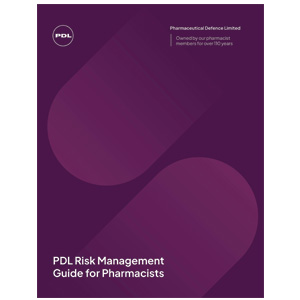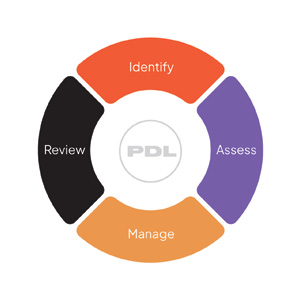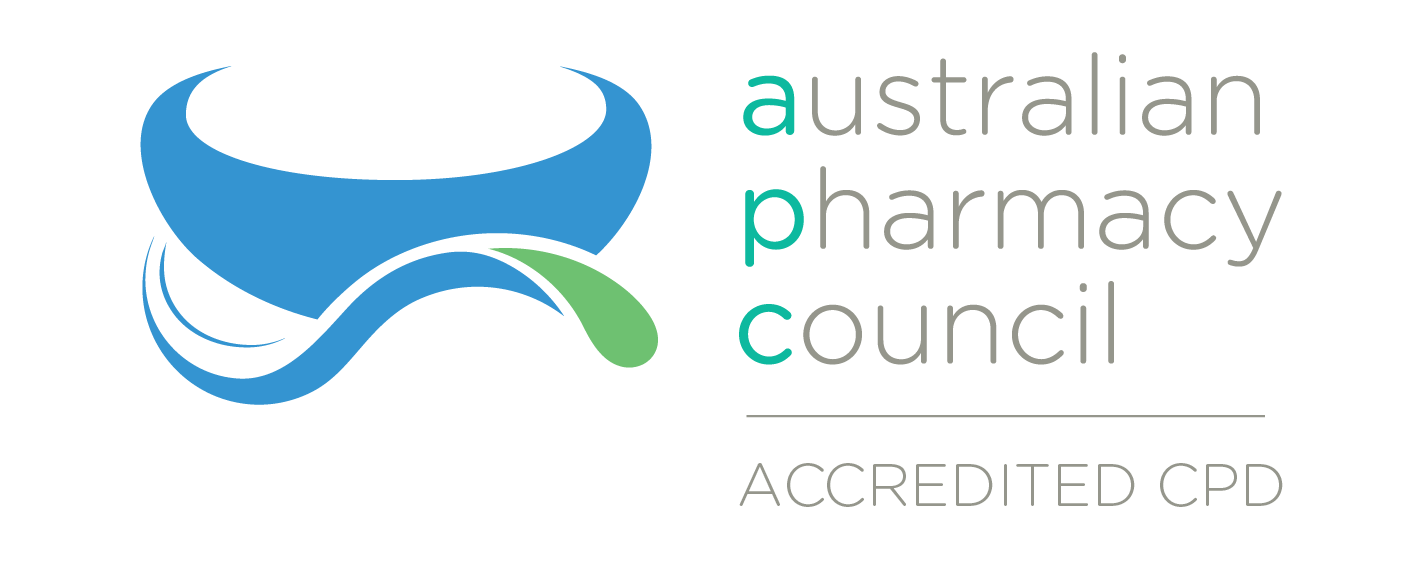- Home
- About
-
-
About
-
-
-
- Membership
-
-
Membership
-
-
-
- Risk Management Resources
-
-
Risk Management Resources
-
-
-
PDL Risk Management Guide for Pharmacists
PDL Risk Management Guide for Pharmacists
A structured approach to identifying and mitigating risk in practice
PDL Risk Management Guide for Pharmacists

Every pharmacist has faced a moment of doubt that might have led to a near miss or incident. If you have ever been worried about an event that may compromise patient safety or put your registration at risk, you’re not alone.
The PDL Risk Management Guide for Pharmacists offers a structured approach to identifying and mitigating risk in practice, through:
1. Real-world case scenarios
2. Practical tools
3. Reflective activities
Its principles are widely applicable and may be relevant to pharmacists in any role, location or seniority.
The Risk Management Cycle
The Risk Management Cycle, referenced throughout the Guide, helps pharmacists build professional accountability and a mindset of continuous quality improvement in daily practice. It supports good clinical governance and is recommended as part of a standard approach to reduce risk in the delivery of pharmacy services.

CPD accreditation
There are four modules, and each one is accredited for Group 1 CPD, suitable for inclusion in an individual pharmacist’s CPD plan. Accreditation information is located at the beginning of each module and within the Executive Summary.
At the completion of all four modules, pharmacists are offered an opportunity for further Group 3 CPD credits if they choose to follow (and document) a defined list of actions that ultimately facilitate quality or practice improvement. These actions must include: identification of a risk in practice resulting from an incident, near miss or existing or proposed professional service, using the PDL Risk Assessment Tool to determine the risk level(s) of current practices, actioning steps that lead to improvements in practice to reduce these risks, and reviewing outcomes after a suitable and defined amount of time.
This is a self-led, non-accredited exercise using the PDL Risk Assessment Tool and is entirely appropriate for pharmacists’ CPD Record after all of the steps in bold are completed (and documented).
This module is designed to equip you with basic knowledge and concepts to begin fostering a risk mindset. It addresses the IDENTIFY and ASSESS components of the Risk Management Cycle.

Accreditation Number: A2507PDL1
This activity has been accredited for 1.5 hours of Group 1 CPD (or 1.5 CPD credits) suitable for inclusion in an individual pharmacist’s CPD plan.
The 2016 Competency Standards addressed by this activity include: 1.1, 1.2, 1.3, 1.4, 1.5, 1.6, 2.2, 2.3, 2.4, 3.1, 4.1, 4.2, 4.3, 4.7
Accreditation expires: 30/6/2027
This module builds upon the foundational concepts introduced in Module 1, helping readers to develop a more holistic approach to assessing risk and providing a structure to support the implementation of effective systems and processes. It addresses the ASSESS and MANAGE components of the Risk Management Cycle.

Accreditation Number: A2507PDL2
This activity has been accredited for 1.5 hours of Group 1 CPD (or 1.5 CPD credits) suitable for inclusion in an individual pharmacist’s CPD plan.
The 2016 Competency Standards addressed by this activity include: 1.3, 1.6, 2.1, 2.2, 2.3, 2.4, 3.1, 4.2, 4.3, 4.5, 4.6, 4.7
Accreditation expires: 30/6/2027
This module will guide you through the steps that follow a near miss or incident in your practice. It will help you understand the processes following an incident, implement measures for yourself and others to minimise risk of further adverse events, and develop effective reflective practices to support continuous learning and improvement. It addresses the MANAGE and REVIEW components of the Risk Management Cycle.

Accreditation Number: A2507PDL3
This activity has been accredited for 1.0 hour of Group 1 CPD (or 1.0 CPD credit) suitable for inclusion in an individual pharmacist’s CPD plan.
The 2016 Competency Standards addressed by this activity include: 1.3, 1.6, 2.1, 2.3, 2.4, 4.1, 4.2, 4.3, 4.6
Accreditation expires: 30/6/2027
This module brings together all four components of the Risk Management Cycle, illustrating how each stage could be applied in real-world practice. It targets five key risk areas commonly associated with incidents. Readers will also be encouraged to recognise the risk principles in this document and apply them to emergent areas in pharmacy, to minimise the impact of potential risks.

Accreditation Number: A2507PDL4
This activity has been accredited for 1.5 hours of Group 1 CPD (or 1.5 CPD credits) suitable for inclusion in an individual pharmacist’s CPD plan.
The 2016 Competency Standards addressed by this activity include: 1.1, 1.2, 1.3, 1.4, 1.5, 1.6, 2.3, 2.4, 3.1, 4.2, 4.3, 4.4, 4.7
Accreditation expires: 30/6/2027

